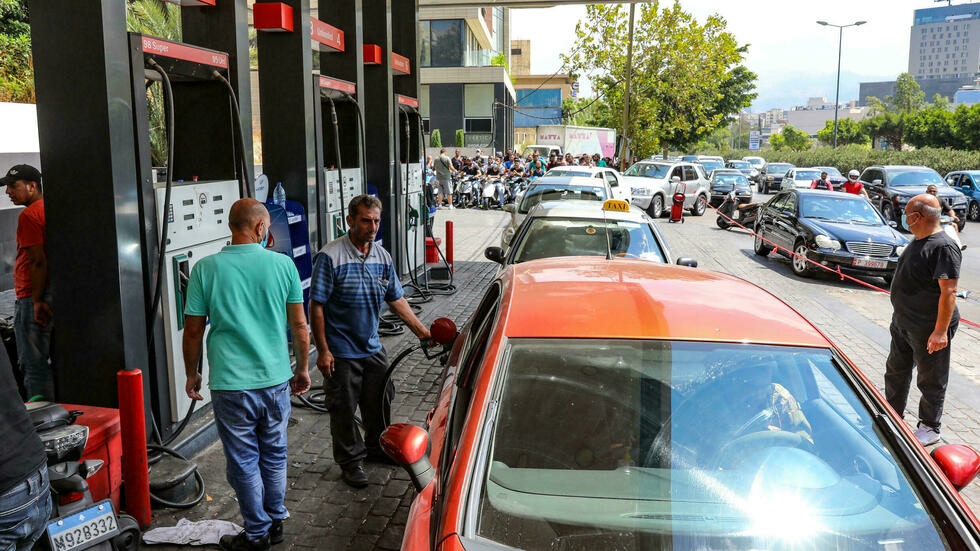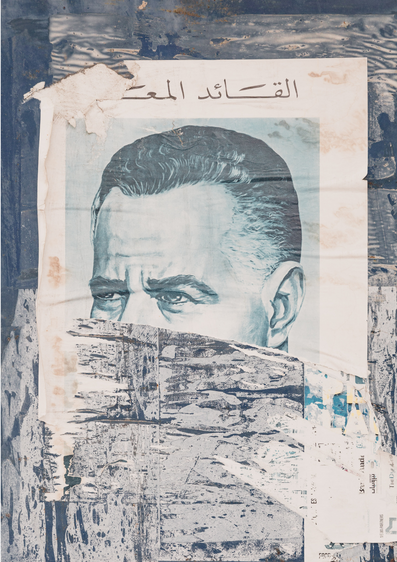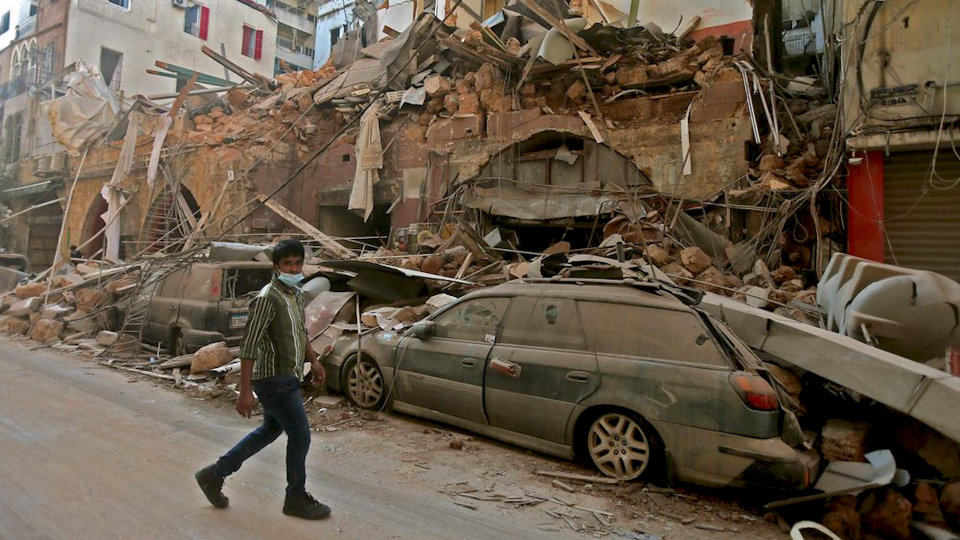For the past few weeks, Lebanon has experienced a fuel crisis which has led to a doubling of fuel prices, and mass electricity cuts, leaving residents with 1 to 2 hours of electricity a day if lucky. More alarmingly, Lebanon is now currently facing critical water shortages, which will leave an estimated 4 million people without access to safe water.
In the midst of such unrest and instability unfolding, One Young World Ambassadors from the country share their insights on the implications of recent developments.
Views reflect those of the author(s). Reflections have been edited for length and/or clarity.
Lara Tabet
It is hard to see your country crumble from afar.
It is hard to see your country crumble from afar.
When things can no longer be solved through sharing and giving, through community support or private subsidies, you feel powerless.
What you feel is despair and your solution is for your loved ones to GET OUT!
But what is harder is seeing your families live the stages of grief slowly, knowing they can never truly get “out”.

Anwar Amro, AFP
Denial comes first. You think you’ve lived this already, that it is just the same as always, that it will get better tomorrow, next week, next month. That horrible things are happening but that they won’t happen to you because you’ve survived a war already, surely this isn’t as bad. We’ll be fine.
Anger comes next. Anger comes and goes because denial still hasn’t left you. You are angry to see your politicians doing nothing or even making things worse. You are angry that with all the bright Lebanese minds abroad and in the country, there is nothing to be done. You are angry to see that our lives are just pawns in a much bigger game.
Bargaining is an idea. If it is a game, maybe we are able to play! Maybe, we can settle for even less? Maybe, if we have this great weather and this beautiful nature, we can see power cuts as an opportunity to savor those. Maybe, if they just provided power and water to hospitals it’ll be enough for a while?
Depression is when you realise no one is responding to your bargain. There is nobody in charge. Do the leaders care? Nationally? Internationally? Who is there to hear your plea? How much longer can you survive with no access to power, water, food and medication? How has it come to this? There are too many questions but no answers and no energy. You give up, it’s calmer this way.
Acceptance. What is it that you accept? Do you accept to leave? Do you accept giving your children a more stable future, even if outside of this country? Do you accept to leave your home, your roots, your extended family behind? Acceptance doesn’t come easy. Maybe we can stay. Maybe we’ll be fine. We’ve lived this already. We survived a war before. Surely this isn’t as bad. It looks like we are in denial all over again…
Michelle Abou-Raad
Please don't stop talking about Lebanon.
As a Lebanese-American, I am horrified by the events that are unfolding in Lebanon.
Although I have never lived in Lebanon, most of my family still resides there and I have spent some of my favorite summers in Lebanon, experiencing the warm and welcoming culture. My heart breaks for everyone facing these catastrophic events, especially the youth, but I can't help feeling pangs of guilt as I write this from the comfort of my apartment abroad with 24/7 electricity, air conditioning, and a full fridge (privileges that most of those living in Lebanon currently do not have).
All I can do is watch from afar, checking in with family and friends and trying to raise awareness. I ask one thing from you: please don't stop talking about Lebanon.
Please don't forget about the almost 7 million people living in a country that continues to plunge into one of the worst economic crises that the world has seen in the last 150 years.
Khalil Osta
Is there a way out of the pit?
“Greed is a bottomless pit which exhausts the person in an endless effort to satisfy the need without ever reaching satisfaction.” Erich Fromm - German social psychologist
For me, greed is the root of our problems. Greed engendered corruption, neglect, and mass murder. Contrasting with what Erich Fromm said, however, in this case, the greedy isn’t the one suffering. It’s Lebanon.

Brian Wertheim

Christelle Hayek
Lebanon is suffering and is the living proof of how dangerous human nature can become when it succumbs to greed. Lebanon is the one falling down the pit. Our corrupted, neglecting, murderer ruling class - the same ruling class for the past 30 years now - isn’t reaching satisfaction. The greedier they grow, the lower the Lebanese people fall down the pit. Every time we think we’ve hit rock-bottom, we’re proven wrong, and deeper we fall.
We’re living the world’s worst financial collapse since the mid-1800s according to the World Bank. I won’t dwell on how daily life has become, how it’s no longer about resilience, how it is now about survival, how the most basic of necessities has become a privilege: destroyed homes, hours of queues for fuel, no electricity, scarce bread.
Many left and many are still trying to leave, trying to flee their own country. Even more have stayed. Not everyone can afford to leave.

Marten Bjork
Many, who are blinded, bought and brainwashed, still follow this ruling class, feeding their greed, empowering them. Others have lost hope. They remain hopeless and helpless.
But some do believe in a cause. They have hope. They still fight.
But how can one fight greed? It’s insatiable. The greed of this ruling class, itself a puppet to external influences and foreign hidden agendas might be the end of the Lebanese people. Can we even fight greed? Is there a way out of the pit?
Jean El Achkar
The Lebanese are crying… But our voices are falling on deaf ears.
Written on August 18th:
No words can describe what is happening in Lebanon today: Lebanese Lira's severe meltdown, political corruption, the heaviest economic crisis ever witnessed in the country.

Agence France-Presse/Getty Images
Let’s start with the Beirut Port Explosion on August 4, 2020, one of the biggest non-nuclear blasts in history. The number of people killed reached more than 220, with more than 6,500 injured and some 300,000 made homeless. It is a crime that shattered the soul of an entire nation, causing a deeply disturbing trauma. The process of healing from this tragedy is being denied by the Lebanese people, as no one has been held responsible and the country is sinking deeper into crisis. On August 15, 2021, an oil tanker explosion killed at least 28 people and injured 80 others in northern Lebanon's governorate Akkar.

Anwar Amro/AFP/Getty Images

AFP Photo
Today is August 18, 2021, there is no fuel in Lebanon, no electricity, no bread, no medication, and no hope. In the hot and humid weather of August, families in Beirut sleep on their balconies or even do not sleep at all due to the lack of electricity. We are lining up for hours at the gas station fighting over the last drops of oil. Food in our fridges is going to be wasted because there is no proper preservation. Hospitals collapse due to fuel shortages and lives are threatened by death. Pharmacies can’t sell basic drugs, and essential stores and main businesses are shutting down. The average salary has become $50, even less for many.
Until when? How much more? The Lebanese are crying… But our voices are falling on deaf ears.
This is Lebanon today. #TalkAboutLebanon
An Anonymous Call to Action
The basic call is for the international community to support the below:
- investigations on the stolen money from the corrupt government
- food & medical supplies
- solar power systems for hospitals (the shortage of fuel is putting patient's lives in danger)
If you are able to offer any support, connections, or resources to those currently based in Lebanon, please reach out.
Email us: community@oneyoungworld.com